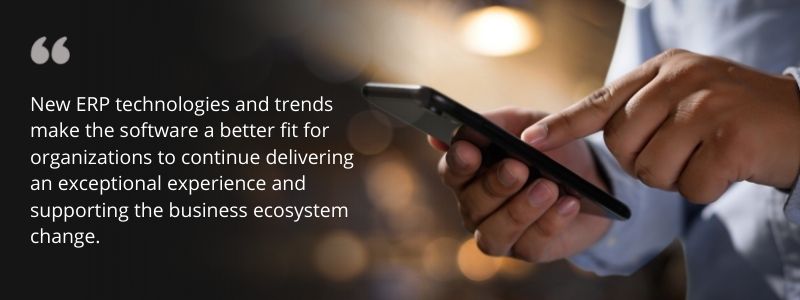The Key ERP Technologies and Trends: How Has Evolved?
The pandemic has fast-tracked the adoption of digital transformation back in 2020, which continues as a reliable practice to meet today’s challenges. New ERP technologies and trends make the software a better fit for next-generation organizations. The ERP trends that are worth knowing about this year are:
Cloud ERP adoption
Cloud or SaaS-based ERP software is not a breakthrough technology and has been in use for a long time, but with the pandemic outbreak when remote working became the new normal, cloud deployment became a go-to choice. This growing demand for cloud ERP software is due to its easy implementation, low deployment cost, and superior collaboration features. The systems are even capable of extending users’ access to real-time information and facilitating remote working while ensuring high data security.
In 2022, there would be a quantum leap in accelerated cloud usage, with improvement in security protocol and compliance to deal with the new realities.
Dominance of intelligent applications
AI technology extensively contributes to transforming the way ERP operates. From automating repetitive tasks to proactively identifying problems and solving them, an AI-embedded system mitigates operational inefficiencies and improves productivity across your business processes.
With the use of intelligent predictive analytics and hyper-automation tools, AI-embedded ERP software takes business process management to the next level, instilling better decision-making and enhanced customer experience. Precisely, machine learning, natural language processing, and chatbots unveil suggested outcomes and actions to achieve your business goals, reduce overhead costs, increase productivity, and improve operations.
In 2022, enterprises are more likely to infuse their ERP systems with AI to help them decide the next best actions for business planning.
Hybrid integration platform
The hybrid platform is the architectural framework that allows on-premises and cloud-based integration and governance. This model has the ability to deploy certain workloads and enables compliance and availability needs of a hybrid office. For example, a sales manager could allocate tasks to the different sales teams and keep track of the progress when the employees work together in a physical office and when they work remotely.
Suppose you already have an established on-premises ERP system in your company. In that case, the hybrid model lets you integrate a cloud solution to support your business needs by quickly adding newer functions without disturbing the current system.
Composable software platform
It is a technology strategy that supports flexibility and faster adaptation to changes. Composable ERP is built by assembling and orchestrating the right set of software capabilities to deliver the best business outcomes focused on end-users. It could be composed and recomposed by tailoring existing components and combining them with new ones to help organizations master the capabilities to address new and abrupt business challenges.

Tracking and measuring change through defined metrics
Historically, ERP software customization needed complex scripting languages and was challenging to customize according to the needs of each business. Today, flexibility and ease of use are top priorities for software, and it is expected that ERP systems become easily extensible platforms to match the requirements of individual businesses.
In 2022, organizations would be able to take advantage of ERP applications designed for more straightforward configuration. These are known as low code/no-code ERP with customization abilities that enable businesses to quickly tweak the application by adding features to it as per their requirements and make it work as per your industry standards while allowing you to innovate and stand out in the competition. Thus, low code/no-code ERP provides business users with minimal IT skills to modify or create simple application, data, and process integration tasks.
Embedded predictive analytics
This is a familiar tends from the past, but it would be more focused on adoption or gaining technology maturity this year.
Predictive analytics embedded ERP solutions combine multiple statistical techniques to analyze various data sources and ERP transactional data, to make actionable predictions about business events. As it is becoming increasingly important for companies to make data-driven decisions and prioritize accurate forecasting, investing in an enterprise resource planning system with a strong data analytics tool becomes necessary.
In 2022, businesses would be looking for a data analytics-powered ERP system to generate ad-hoc reports and elevate their predictive decision-making capabilities.
Digital twin
It is the virtual representation of an entity, such as an asset, person, or process, enabling organizations to create and evolve digital business models. Digital twins use data, machine learning, and IoT technologies to help businesses constantly monitor the stream of performance information in real-time, simplify and accelerate the digital transformation, and optimize new service delivery.
Impacts: What Would Future Business Applications be Like?
Overall, technologies used in ERP are set to evolve and change to fit the business goals and new market conditions. Organizations should keep an eye out for the latest trends in 2022, as staying up-to-date is imperative for businesses to survive.
In the near term, organizations would continue to deliver experience by ensuring their ERP software is equipped enough to support the change in the business ecosystem.
How We can Help your Business?
If you’re looking to implement your first ERP software or upgrade your existing system, we could help you skip the long-term evaluation, selection, and implementation process. Our team of experts would make your efforts more likely to be fruitful.
Fill in the form to get started.







